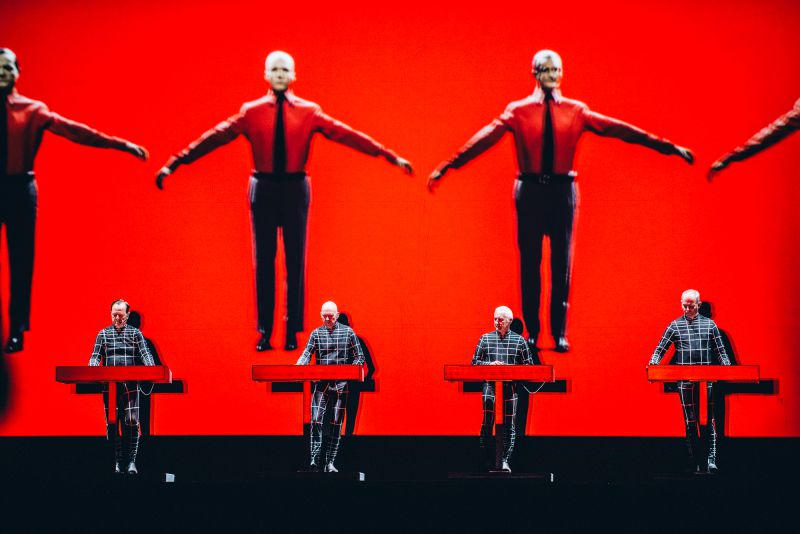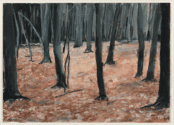For a group so associated with emotionlessness and coldness, Kraftwerk have left a deep emotional trace on generations of listeners. The alienated coldness of “Sex Object” and the in- (or post-) human severity of “It’s More Fun to Compute” are products of the same coolly romantic art project that gave us the beauty of “Neon Lights” or the techno-pastoral optimism of “Morgenspaziergang”. There are numerous contradictions and layers in what Uwe Schütte, author of the latest book on the group, insists we have to view as a Gesamtkunstwerk and he has made it his mission to explore these to an Anglophone Kraftwerk audience who may never have considered some of the questions and sources he raises.
 The book’s style is light, readable and playful and yet the book gets straight to the heart of some very weighty questions. Like it’s subject, the book has a serious cultural agenda pursued via a pop format (although it’s still highly likely that it will be seen as too dense or – the ultimate heresy in the 2020s Anglosphere – too intellectual.
The book’s style is light, readable and playful and yet the book gets straight to the heart of some very weighty questions. Like it’s subject, the book has a serious cultural agenda pursued via a pop format (although it’s still highly likely that it will be seen as too dense or – the ultimate heresy in the 2020s Anglosphere – too intellectual.
It is the first Kraftwerk publication to cover the most recent evolution of Kraftwerk as a permanently-touring, self-mythologising artwork. Schütte has no doubt about the value and significance of late-phase “3D” Kraftwerk. He also makes a strong case for the 2003 Tour De France Soundtracks album and his analytical approach doesn’t preclude the transmission of genuine, undimmed enthusiasm. The group emerged in a still-troubled but much more optimistic era, which Schütte characterises as “between genocide and a brighter future.” At the dawn of the 2020s it is daily harder to conceive of such a time but the book brings it back to life vividly. For Kraftwerk listeners such as myself, who perceive an increasing destruction or flattening of the group’s hard-won aura in the 3D era, this is an interesting challenge and on the author takes on whole-heartedly, in the same enlightened, idealistic, transnational spirit that the group have always tried to manifest. Alexei Monroe spoke to the author about some of the book’s key themes.
What was the most surprising thing that you learnt while working on the book?
I think the fact that despite listening to Kraftwerk over and over again while writing, re-writing and revising the copy/book, I never tired of their music. In its first version it was thematically structured around five main topics – but Penguin didn’t like it that much and suggested a chronological re-write. So it took a while, not least as it takes me longer to write in English, but Kraftwerk was almost always on my headphones. And I still want to listen to them….
What is your favourite album?
My first Kraftwerk album, bought when I was 10 or 11, was Radio-Aktivität. And, in a way, that is still my favourite album. I like that is it more of an experimental listing piece than a pop album. The albums I listen to the most are the two underrated ones, Tour de France and Techno Pop. And, if it is/I am allowed to admit, I dislike Autobahn and my least favourite Kraftwerk song is “Das Modell”. I’d much rather listen to “Vitamin” or “Musique Non Stop”.
What was your first experience of Kraftwerk and was it ‘love at first listen’?
I heard “Autobahn” as a child at some point, inevitably, as it was all over German radio at the time. But it must have been a few years after the release in 1974. I only really fell in love with Kraftwerk at the 2004 show at the Brixton Academy when I saw them for the first time. That was a truly mind-blowing experience, also sonically, even though it was stereo at the time. And the new 3D shows with the up to 38 channel wavefield synthesis PA is even much much better…
You stress that Kraftwerk saw the (1970s) present as a void and that they wanted to create a more positive future from lost pasts (Bauhaus, Constructivism et. al.). Could you say a little more about this void and is this not relevant to our own time?
The 1970s were the years of my childhood, so when listening to Kraftwerk now and reading their interviews retrospectively, it resonated with my memories of that period – the first video games (like Pong), the Baader-Meinhof terrorist scare (which is a theme in Computerwelt) or [a few years later] the advent of was called BTX at the time [the BTX/Bildschirmtext phone/terminal communication system launched in 1982]. When I look back now as an historically educated/informed adult, I view that period in German history as a sort of paradise: social democratic rule under Chancellor Willy Brandt, social reform and liberalisation, better relations with East Germany and the communist bloc, modernisation of the education system, particularly the universities and so on. Both my parents have no formal qualifications, my mother is a refugee from Slovenia, my father an unskilled worker – yet I made my Abitur (A levels equivalent), went to university and became an academic in the UK.
But Kraftwerk, that is to say Ralf Hütter and Florian Schneider, were a generation older than me, they saw their present as a continuation of the Nazi past, and their intention was to build a way, artistically, to arrive at a better future, a better Germany than the horrible Nazi past in the aftermath of which they grew up. Hence their recourse to lost pasts cut short by the Nazis, as a way to construct a new, untainted sense of German identity. And it is that vision which I believe is very important today, at a time when we see the world crumbling around us: global warming, right wing populism, digital surveillance and the sordid rest…
Are there any currently active groups you believe are successfully continuing the tradition of Industrielle Volksmusik [roughly “Industrial Folk Music”, although as the author points out, the concept has a deeper set of meanings] or was Kraftwerk’s success to make this impossible?
I assume the latter is the case. As a German, I cannot help but see Rammstein as the usurpers of that concept albeit taken literally and in an opposite way to how Kraftwerk intended it: Kraftwerk wanted to imbue the reactionary term Volksmusik with a new meaning and a new sound, electronic music that is made of and by the people, if you like – a democratic music, music that is popular, in a positive sense. Rammstein make reactionary music, exploiting fascist imagery and toy with nationalist, right-wing lyrics. I even believe them that this is not really serious, but a punk thing, if you like, to provoke the left-liberals and to play their role as baddies from East Germany. But all of that is cynical, they are now millionaires while pretending to be the mouthpiece of disadvantaged East Germans. Now that we have a substantial number of members of the openly fascist AfD party in every parliament in Germany and racist atrocities committed on a daily basis, it is abhorrent to have tens of thousands people bawling lines such as these at their concerts:
“Deutschland, mein Herz in Flammen (Germany, my heart in flames)
Will dich lieben und verdammen (I want to love and to curse you)
Deutschland, dein Atem kalt (Germany, your breath so cold)
So jung, und doch so alt (So young, and yet so old)
Deutschland!” (Germany!)
Is it still possible to create concrete utopias as Kraftwerk did, in music or any other form? (The Barbican in London has recently released a bland and expensive range of Brutalist-inspired clothing with this name.)
I am not so sure. Mark Fisher despairingly asked: ‘Where is the 21st-century equivalent of Kraftwerk?’ as he saw no equivalent to their art in today’s pop music. And I regret to say that I agree with him. I think the last time I had the feeling that a truly new form of pop music had arrived was when I first head Portishead and Tricky, that is to say: quite a while back. Or wait: No, it was the first album by Burial. Again, quite a way back. But it may be an age thing: though I do try to listen to new electronic music that critics get excited about, I don’t get it really. Loraine James’s album on the Hyperdub label, for example, bores me very quickly.
You’ve converted your own son to Kraftwerk: is it the utopianism that he and other children connect to?
Well, young children pick up on what their parents hear and both the songs being in German and on topics like driving a car or robots appeal to children. Now he is a teenager of twelve, speaks English pretty well and listens to Billie Eilish and The Weekend…. I think utopianism is not a category that applies to children. Now, as a teenager, he worries a lot about the future, joins the Friday for Future marches but at the same does not understand that total immersion in digital media poses a problem.
Do you agree with David Stubbs and others who feel that Kraftwerk should re-release, rehabilitate and perhaps even perform the early albums?
Yes and no. It would be great to have them officially available for the sake of getting new Kraftwerk releases, even if it is old music. But I don‘t rate the early albums over the stuff that came later. They are of musical historical interest, for sure, but I don’t idolise them. What I liked very much, though, were the recent new interpretations by Zeitkratzer, two albums called “Zeitkratzer plays Songs from “Kraftwerk 1” and “Kraftwerk 2” (from 2017 and 2019). What I am really hoping for is a new EP in the vein of the Expo 2000 single…. Or more approved remixes, such as the great versions of “La Forme” and “Aerodynamik” by Hot Chip.
What does your Anglophile German perspective offer that previous Kraftwerk commentators have not been able to?
My book is the first to trace the evolution of the live shows and the performance practise, which is of a course a fascinating story. I also pay particular attention to the visual aspect, as it became an ever more important counterpart to the music, not least because of the full 3D shows they play these days. Actually, Future Music From Germany is the first book on Kraftwerk written by a German, and it is written specially with an Anglophone reading audience in mind. It allows me to draw from material in German, interviews, reviews etc., that do not feature in the previous books written by monoglot music journalists. I discuss the differences between the German and English lyrics, or explain the socio-historical background and some cultural oddities of the Rhine-Ruhr area around Düsseldorf that band members hail from. Also, I aim to explain why Kraftwerk are more of a European than a German band. And, by the way, I am not so sure anymore about being an Anglophile after Brexit, to be honest…
How does this book differ from your recent German publication on Kraftwerk?
That book, Mensch-Maschinen-Musik. Das Gesamtkunstwerk Kraftwerk, was an edited volume collecting academic papers given at the two Kraftwerk conferences I organised in 2015 at Aston University and in Düsseldorf. For that reason, it is pretty diverse and also looks at some issues in academic detail. And it is written for a German-speaking audience. The main focus of the that book is the man-machine concept and questions of post-humanism. The Penguin book, on the contrary, is more concerned with the notion of the Gesamtkunstwerk nature of Kraftwerk’s artistic project.
Are there any cases where the English lyrics function more effectively than the German?
Hm, that would be for English native speakers to judge. In any case, the English lyrics are often simplified and, in some cases, even entire phrases are dropped. Emil Schult did a good job in translating them, but there is always something lost in translation, inevitably. Plus some oddities, such as the surely unintended double-entendre of a line like ‘We are standing here / Exposing ourselves / We are showroom dummies’.
In the 1 2 3 4 5 6 7 8 era of gallery performances, I’ve noticed that unlike in the 2004-5 “Minimum Maximum” period, Kraftwerk performances are more improvisational again. Arrangements are varied and risks are taken, not always successfully. Do you approve of this and can we see it as an ambivalent strategy to escape museumization while contributing to it?
Oh yes, I do approve, also of the fact that they curate their catalogue rather than making new music. The fact that once Florian Schneider had left the band in 2008, Ralf Hütter took Kraftwerk on a seemingly never-ending tour is also fascinating. While in the early 1980s they were the first band to take their studio on the road for the Computerwelt world tour, the stage is now their studio, as it were. Also, each and every mistake they make – each missed entry, or the wrong key being pressed – confirms that they indeed play live, and that they are humans after all… The music still evolves through/thanks to their on-stage experimentation, though only subtly, but I feel it is better to hear a new arrangement for, say Die Roboter, than a new song that only disappoints.
You discuss what you call “the abstract Kraftwerk persona” (as opposed to the group members or their robot doubles). Can you expand on this? Would this persona be robust enough to allow Kraftwerk to continue to perform without any of the current members? And is it possible that this persona might develop its own neuroses based on its contradictions, like HAL in 2001?
I see what you are getting at, and it is indeed very interesting indeed to speculate how Kraftwerk will continue to exist once Ralf Hütter, who is 73 years old after all, will not be able to perform anymore. I doubt very much that they will send robots with a playback show on tour…. The “Kraftwerk persona” is really an academic concept used to stress that I treat performance practice, music, design, cover artwork, lyrics and things such as the refusal to talk about personal matters in the rare interviews as aspects of their art project. My book focuses on the band as a Gesamtkunstwerk concept, abstracting from the real people. I do of course know all the gossip about Ralf Hütter sending out legal letters to former members banning this and that while they supposedly have to use legal means to get the money he owes them, or the speculations about the rift between Hütter and Schneider, but all of these human flaws and vanities don’t interest me at all.
Does KW’s cultural immortality depend on the paradox that they made themselves obsolescent as sonic innovators by beaming themselves so far into the future that they could never repeat such innovation?
Yes, you hit the nail on the head, that is their great achievement and their major problem/obstacle. Hence the constant re-working of their repertoire strikes me as the only way [forward] and the perfect solution: to keep the classics alive and fresh, if you like. And in any case, this approach is much better than releasing a disappointing new album.
Main image: EDP CoolJazz

From Speak and Spell to Laibach.



















